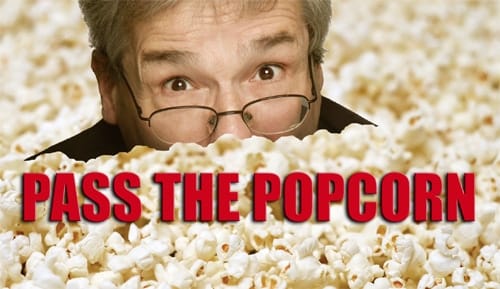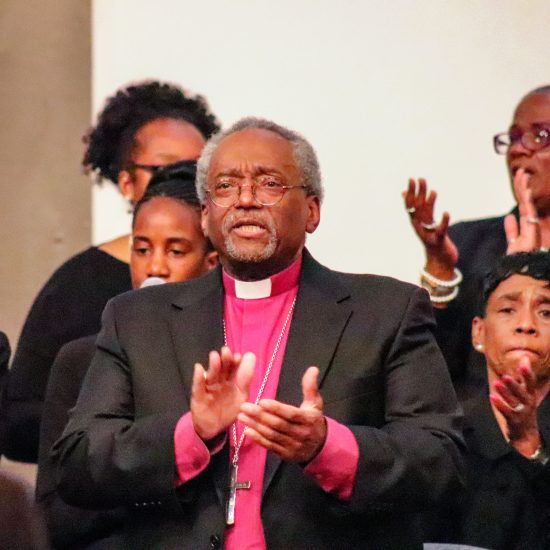By Jennifer Harris
Word&Way News Writer
 If Christians don’t learn to engage the popular culture that surrounds them, they will drown in it, experts insist.
If Christians don’t learn to engage the popular culture that surrounds them, they will drown in it, experts insist.
Christians tend to hear the words ‘popular culture’ and react as if spitting something yucky from their mouths,” said David Dark, author of “Everyday Apocalypse: The Sacred Revealed in Radiohead, The Simpsons and Other Pop Culture Icons” and “The Gospel According to America.”
But popular simply means “of the people,” he said. “It is never something we exist objectively from. It’s like the air we breathe, the language we use…. If we’re thinking, ‘Now we’re going to engage pop culture,’ it’s too late. We’re already soaking in it.”
Jeffrey Overstreet, contributing editor for Seattle Pacific University’s “Response” magazine, freelance movie reviewer, and author of “Through a Screen Darkly” and “Auralia’s Colors,” agreed.
“We are born into a pop culture,” he said, describing that culture as the very temporary, disposable details of a particular time and place.
Overstreet didn’t always see the importance of connection to culture. He grew up in a family that encouraged him to avoid pop culture and “steer clear of anything that did not have a clear connection to church,” he said. Rock music was questionable, and theaters were “dens of sin, contaminated by culture.”
Under the guidance of teachers, he realized complete separation from culture wasn’t the model Christ set.
“He was to be found at the corner pub, surrounded by messed-up people,” he said. “He was there among them, but he was different. He was compassionate.
“The more I look at it, in order to have a meaningful influence on society, we need to live fully engaged lives. How do we do that without hearing the stories told? Without listening to the music played?”
If Christians aren’t engaged in culture, they will not change the world or impact society, said Greg Fiebig, associate professor of communication and theater at Indiana Wesleyan University and former theater director at Southwest Baptist University in Bolivar. “We’re not going to do it. Period.”
He said Christians, especially in Christian academia, tend to live in a bubble. “People isolate themselves,” he said. “There is nothing wrong with isolating ourselves — Jesus did — but if we don’t know how to exist in the larger culture when we emerge, we have failed.”
Instead of hiding from culture, Christians can use it as a learning tool, Fiebig said.
“When I show someone a movie or present a show, I’m telling a story that needs to be told,” he said. “Jesus spoke of loving and caring for people where they were. The last thing he did was judge people. It is harder for us to judge when we are willing to listen to their story.”
Part of the learning experience is realizing that Christians don’t have a monopoly on the truth, Dark said.
“We are learners of Christianity,” he said. “It’s weird the way we talk, as if truth is something we have over other people. That’s no way to talk about faith — as if it is property…. When we view our faith as a bragging right or a secret password, I don’t know how we think others will be attracted to that.”
Instead, that type of view cuts Christians off from their neighbors, Overstreet said. “We need to see and understand our neighbors,” he said. If Christians only pay attention to items of culture that affirm their own worldview, “we don’t understand what the world looks like to them.”
Christ went to the woman at the well and began asking her questions, he said. He didn’t simply bombard her with the gospel.
Dark added that people know when they are being marketed. “So much of Christian art is just advertising for Jesus,” he said. “If we just keep shouting, we shouldn’t be surprised when people react like we are salesmen.”
He recalled driving under an overpass where someone had spray-painted in big letters, “Jesus is the answer.” Underneath, in a different color, another person had responded, “Yes, but what’s the question?”
Christians shouldn’t be handing out answers to questions that haven’t been asked, he said. Instead, pop culture can be used to kindle questions.
Engaging culture will, no doubt, lead to viewing, reading or listening to objectionable content.
“As a Christian, I believe it can be insightful to critique movies for what they might have to say about important aspects of our lives,” said David Thomas, associate professor of rhetoric, emeritus, at the University of Richmond and freelance writer for “Christian Ethics Today.”
“I’m less interested in whether a movie contains language that offends me, or has scenes that depict sex or violence, than I am in determining whether the stories and characters ring true and in what the characters’ moral and ethical choices lead to.”
“Christians tend to believe that films have the power to single-handedly disrupt or uproot a person’s spiritual development if they contain corrupting elements,” said Chad Johnston, production assistant for Allen Press in Lawrence, Kan., and adjunct online instructor in communication and film at Drury University in Springfield.
“I do think people should be discerning about what they watch, but throwing out the baby with the bathwater — and sometimes the bathtub — is a flawed method of encountering and dealing with media.”
He compares watching films to meeting people. When meeting a person, it is easy to dismiss him or her due to a simple disagreement, but perhaps at the expense of a potential relationship or opportunity for growth, he said.
“It always surprises me that Christians will dismiss an R-rated film, yet read R-rated books in the Bible, like Judges,” he said.
“I tend to think that life is R-rated and should not be experienced without a Parent — i.e., our heavenly Father. After all, how can we handle the tougher realities of life being as fragile as we are? So I recommend that if you are hesitant to watch a particular film, you should ask yourself why, and perhaps do some research. If you are still uncomfortable with seeing it, or you simply feel it is bankrupt of any value spiritually, by all means avoid it.”
“To think of a human story as objectionable is not fair,” Dark observed. “If all we do is count bad words or feel offended, we are not relating to the world we are called to love or the world God so loved.”
But that does not mean anything goes, he emphasized.
“I wouldn’t say anyone needs to walk into dangerous places,” Overstreet said. “Each person needs to know their own strengths and weaknesses. But a lot of R-rated films are profound movies.
The importance lies in knowing how to interpret films, which may be difficult for those who have never studied literature or other arts, Overstreet said.
Fiebig added that the American culture has lost a lot of ability for interpretation because of the tendency to be individualistic. “Movies are not meant to be seen in the privacy of your own home,” he said. “They should be communal, with time for discussion.”
Dark agreed that too much “privatization” has occurred. Typically, he said, Christians will watch, listen or read, but pretend the stories aren’t important to them when they step into church. “We are not living out loud to one another,” he said.
When Christians view things in isolation, they often miss the redeeming value, he said. “When we live isolated lives, he often hold wrongly applied guilt, as if our enjoyment is somehow separate from our relationship with God.”
Thomas’ church tries to break through the isolation by offering courses in faith and culture. He worked with pastor Doug Gebhard to design a liturgical film class that accompanied the seasons of Lent and Advent.
“The movies we chose had a Lenten or an Advent theme,” Gebhard said. “David explained rhetorical devices in the film—plot, symbolism, etc.—while I pointed out theological themes—suffering, sacrifice, redemption.”
Gebhard has led other classes that reached beyond film.
“I hoped to prod people of faith to look at movies, listen to music, read novels with a lens of faith,” he said. “What spiritual messages can you see in Star Wars? The Matrix? Ironman? Where is Christ found in Springsteen’s anthems? U2’s music?”
Johnston also partnered with a friend to lead a film class, called Sanctuary of the Cinema, at University Heights Baptist Church in Springfield, Mo., where he lived until last year when he moved to Lawrence to begin a Ph.D. program in film at the University of Kansas.
“Our goal was to explore films through the interpretive lens of Christian spirituality—to see the light of God in the light of the silver screen,” he said.
The class met in the upstairs college Sunday School class, which featured comfortable chairs and couches and a projector to watch films on a large smartboard screen.
Sanctuary of the Cinema was advertised at local college campuses, coffee shops and an independent movie theater. As a result, the class was a diverse group. “Some of them were churchgoers, and others were a bit leery about the whole thing being set in a church,” Johnston said.
The group watched independent, art and foreign films together, then discussed the film, using questions from a faith perspective to help guide discussion.
Despite differences among the class members, “we all bonded because of the beauty of cinema,” Johnston said. “I think it’s because cinema is capable of reminding us all of what we share, rather than how we differ. Narrative cinema tells the sorts of stories that are common to all of us, and we therefore feel like we have a share in what’s happening onscreen.”
And ultimately, that viewing can lead to Christ. “I have come to see the silver screen as a window overlooking a theologically charged world,” Johnston said. “As I look through this window, I find that I am better able to understand who God is, who I am, and how I relate to God and others. It is not a substitute for the Bible, but rather a supplement to it.”
A starting place for finding films to use in discussion is the Arts and Faith Top 100 Spiritually Significant films list, published at www.artsandfaith.com/t100. The list is compiled by voting members of the website, including Overstreet, and is updated each year. The website also features discussion groups on film, music, literature, visual art, theater and dance, and television and radio.
Fiebig helps lead a film festival at Indiana Weslyan University. Last year, the first year of the festival, they decided to screen "Hotel Rwanda,"
a film depicting the true story of Paul Resesabagina, a hotel manager who helped house over a thousand Tutsi refugees during the Rwandan genocide.
a film depicting the true story of Paul Resesabagina, a hotel manager who helped house over a thousand Tutsi refugees during the Rwandan genocide.
A student from Uganda, who had lost family members during the struggle, attended the screening. He began the discussion after the film by announcing that he could not stay, due to the fresh emotions the film conjured, but he asked the other students to pray for Rwanda and Uganda.
“It was an amazing moment,” Fiebig said. “In a room full of college students, you could hear a pin drop. A Hollywood film became a worship service.”






